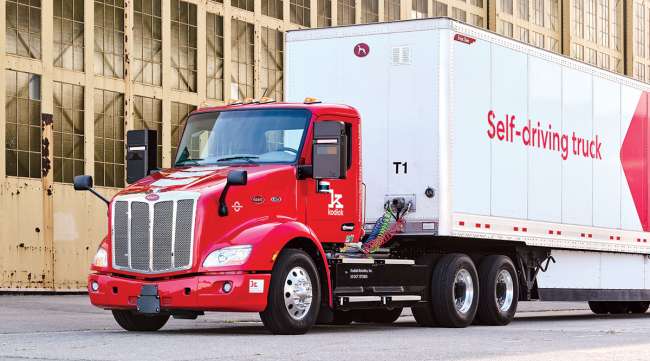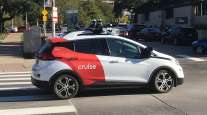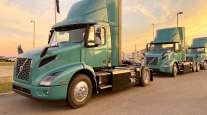San Francisco Chronicle
Driverless Trucks Face Regulatory Opposition in California

[Stay on top of transportation news: Get TTNews in your inbox.]
Driverless 18-wheel trucks won’t be driving down Interstate 880 or any other state highway anytime soon. And if a proposal sailing through the California Legislature becomes law, they won’t be able to do so without a human driver present until at least 2031.
Autonomous trucks are the latest frontier in the regulatory battle between elected officials and an autonomous vehicle industry vying to test and expand services in California that could someday include parcel delivery and longhaul trucking along with ride hails.
Assembly Bill 316 has advanced in the state Legislature at the same time state regulators signed off on a massive expansion of driverless taxis in San Francisco. The Senate Appropriations Committee will decide Sept. 1 whether the bill — and about 500 others — moves on to its final floor vote.
If signed by Gov. Gavin Newsom, AB 316 would require the presence of a human driver in the testing and deployment of driverless heavy-duty trucks for at least five years as the state evaluates their safety.
Business groups and AV companies opposing AB 316 call it a premature proposal that would stifle their entry into a lucrative trucking industry before the state has even allowed testing of large trucks. The bill’s opponents point to driverless trucks’ limited record — they’re already allowed to operate in states such as Arizona, Texas and Arkansas — of zero fatal crashes as proof that they’re safe.
“AB 316 will not make California’s roads safer,” said Jeff Farrah, executive director of the Autonomous Vehicle Industry Association, following the bill’s approval by the Senate Transportation Committee in July. “Instead, the legislation preserves the status quo: 4,400 lives lost in California last year alone in motor vehicle crashes, overwhelmingly caused by human error.”

Transport Topics' Seth Clevenger, Michael Freeze and Mike Senatore dissect the new Top 100 list of the largest private carriers, including how fleets are adapting to this softened market. Tune in above or by going to RoadSigns.ttnews.com.
Beyond its potential to shape the extent of driverless trucking in California, AB 316 represents a significant effort by state lawmakers to seize regulatory power from the state Department of Motor Vehicles that oversees AV testing and deployment. Legislators delegated that responsibility to the DMV in 2012, but several lawmakers in recent hearings have criticized what they described as lax enforcement by the agency.
Assembly Member Cecilia Aguiar-Curry, a Yolo County Democrat and one of the bill’s co-authors, pointed to the rollout of Cruise and Waymo robotaxis in San Francisco as a “perfect example” of why the Legislature should wrest control from the DMV.
The California Public Utilities Commission, which oversees commercial deployment of driverless taxis, permitted Cruise and Waymo’s unrestricted San Francisco expansion despite strong opposition from local officials. Driverless taxis’ expansion, they argue, has increasingly interfered with the city’s emergency responders, and has caused mayhem on everyday traffic when they sometimes drive erratically or “brick” on local streets. Cruise and Waymo say their taxis operate safer than human drivers.
“There’s absolutely no reason to believe the San Francisco experience won’t be repeated in testing driverless trucks,” Aguiar-Curry said at the bill’s Senate Transportation Committee hearing. “Unlike San Francisco taxis, these vehicles weigh an extra 76,000 pounds, drive at significantly higher speeds and present a greater threat to the public. We need data collection.”
Underpinning lawmakers’ debate around AB 316 has been the driverless technology’s potential to eliminate hundreds of thousands of trucking jobs.
Want more news? Listen to today's daily briefing above or go here for more info
“This is a critical decision for our elected officials,” said Peter Finn, western region vice president of the Teamsters, the bill’s sponsor. “Do you stand with working people, or do you stand with big tech, who literally want to create autonomous vehicle technology for one reason only — and that is to eliminate jobs to lower their labor costs.”
California prohibits AV companies from testing autonomous vehicles that weigh more than 10,000 pounds, though the DMV this year began workshops to develop its regulations on driverless trucks.
The DMV and CPUC have overseen the initial testing and deployment of driverless cars in California. State and local lawmakers, though, have said they want more regulatory control over the emerging technology as driverless technology proliferates.
Distributed by Tribune Content Agency, LLC




